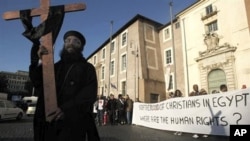For the first time, an independent U.S. commission is recommending Egypt be added to a list of the world’s worst violators of religious liberty. The recommendation was contained in the Commission on International Religious Freedom's annual report.
The bipartisan commission says Egypt’s religious minorities, like Coptic Christians, have faced severe repression before and after the departure of former President Hosni Mubarak.
"In his [Mubarak’s] waning months, religious freedom conditions were rapidly deteriorating, and since his departure, we have seen nothing to indicate that these conditions have improved," said Commission-chairman Leonard Leo.
Leo pointed to recent attacks targeting Christians and other groups in Egypt, including the January bombing of a church in Alexandria.
"The severe level of violence, and the failure to convict those responsible, continue to foster a climate of impunity, making violence more likely. Despite the transitional government’s efforts to dismantle the state’s repressive security apparatus, Egypt’s state of emergency remains, and laws and practices that discriminate continue to hinder religious freedom," he said.
Egypt is one of 14 nations the commission is recommending Secretary of State Hillary Clinton designate as a "country of particular concern" for religious liberty violations. The commission recommends the Obama administration redirect some U.S. military assistance for Egypt towards efforts to protect Coptic Christians and other groups.
Other nations cited by the commission include Burma, China, Eritrea, Iran, Iraq, Nigeria, North Korea, Pakistan, Saudi Arabia, Sudan, Turkmenistan, Uzbekistan, and Vietnam.
Iran has been on the State Department’s list since 1999. Commission-member Nina Shea describes violations of religious freedom there as systematic, egregious, and ongoing.
"Since the disputed June 2009 elections, human-rights and religious-freedom conditions in Iran have regressed to a point not seen since the early days of the Islamic revolution. In the past year religious minorities, in particular Baha’is, Christians and Sufi Muslims, faced intensified physical attacks, harassment, detention, arrests, and imprisonment," Shea said.
In China, the report notes what it calls a marked deterioration in the treatment of Tibetan Buddhists and Uighur Muslims. Commission-member Felice Gaer did note some progress as far as the attitudes of China’s leadership.
"Some senior-level government officials, including President Hu Jintao, have acknowledged the positive role religious communities can play. There are reports now that the government is considering legalizing charitable activities of recognized religious organizations. However, in the last year the Chinese government has issued new guidelines that emphasize guiding or forcing unregistered Protestants to worship in state-sanctioned churches, that require Muslims to pass political tests to go on a religious pilgrimage, and to better-manage Tibetan Buddhist monasteries," Gaer said.
Some nations cited by the commission, like China, have objected to U.S. assessments of human-rights conditions, including religious freedom, as interference in their domestic affairs.
In addition to citing countries of particular concern regarding freedom of worship, the commission named 10 nations on a "watch list" for religious liberty violations: Afghanistan, Belarus, Cuba, India, Indonesia, Laos, Russia, Somalia, Tajikistan, Turkey, and Venezuela.
US Commission Cites Egypt for Violating Religious Freedoms




